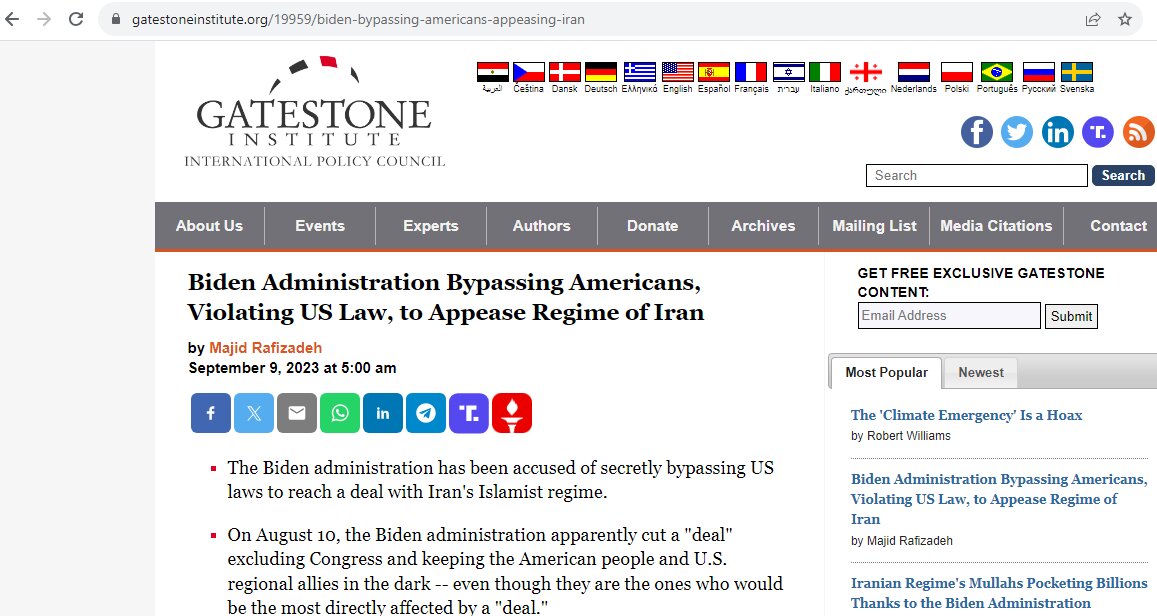Atomic lies

TEHRAN- On September 9, the Gatestone Institute published an article titled "Biden Administration Bypassing Americans, Violating US Law, to Appease Regime of Iran". It accused the Biden administration of "prisoner deal, ransom payment, and nuclear understanding with Iran".
The article, written by Majid Rafizadeh, pointed its sharp criticism at Biden and his administration, questioning the American government over its prisoner swap agreement with Iran. He said the Biden administration "keeps trying to revive the former President Obama's 2015 nuclear deal."
Biden is accused of evading congressional oversight, paying the largest hostage ransom in America's history, making every American on foreign soil a juicy mark, and excluding Congress from the deal.
The analysis claimed that the Biden government is trying to revive President Obama's 2015 "nuclear deal", thereby enabling Iran to have as many nuclear weapons as it can.
On July 14, 2015, the five permanent members of the UN Security Council (China, France, Russia, Britain, and the United States), Germany, and the European Union struck a nuclear deal with Iran, officially known as the Joint Comprehensive Plan of Action (JCPOA). According to the deal, Iran agreed to put limits on its nuclear activities in exchange for the termination of economic and financial sanctions on the Islamic Republic.
Under the deal, Iran agreed to eliminate its stockpile of medium-enriched uranium, cut its stockpile of low-enriched uranium by 98%, and reduce by about two-thirds the number of its gas centrifuges for 13 years. For the next 15 years, Iran agreed to enrich uranium only up to 3.67%.
However, in May 2018, Donald Trump withdrew from the nuclear deal endorsed by UN Security Council Resolution 2231. Despite the U.S. exit from the multilateral agreement Iran remained fully committed to the deal even one year after the U.S. pullout. Iran’s commitment to the JCPOA was confirmed by quarterly reports by the International Atomic Energy Agency.
After a year Iran announced that its strategic patience was over and started to gradually lift sanctions on its nuclear activities. At the time Iran announced that if the European parties to the JCPOA compensated for the U.S. “maximum pressure” campaign against the Islamic Republic, Tehran would reverse its decision.
Despite partially removing hurdles on its nuclear activities Iran still remained to be subject to the most intensive inspections by the Vienna-based UN nuclear watchdog.
IAEA Director General Rafael Mariano Grossi made a visit to Iran in March 2023, meeting President Ebrahim Raisi, Foreign Minister Hossein Amir Abdollahian, and the Atomic Energy Organization of Iran (AEOI) chief Mohammad Eslami.
Grossi's visit ended with a joint statement by the AEOI and the IAEA. The two sides agreed on steps toward enhanced cooperation and recognized that such positive engagements could pave the way for wider agreements.
Given the IAEA reports and its verification of Iran's nuclear activities, how does the author of the article claim that a revival of the JCOPA can help Iran to " have as many nuclear weapons as it likes?"
The Gatestone Institute also claims that Biden broke a 2015 law, the Iran Nuclear Agreement Review Act (INARA) by secretly negotiating and reaching a nuclear "understanding" with Iran. This is a baseless claim. Due to the INARA and the internal obstacles, the Biden administration cannot reach a nuclear agreement with Iran since it faces strong criticism.
"The United States agreed to pay $6 billion... the sum comes to more than a billion dollars per head," said the author as if the American government pays money for the release of prisoners. The fact is that American prisoners, working for spy services under various guises, will be released in exchange for five Iranian prisoners who are imprisoned in the U.S. on charges such as circumventing sanctions.
The Gatestone Institute claims that $6 billion is the "largest hostage ransom payment in America's history". However, the $6 billion is Iran's frozen asset which was illegally blocked in South Korea under U.S. pressure. Paying $6 billion is neither "ransom" nor "favor" but Iran's money.
The writer also asked: "How could the Biden administration keep the American people and allies such as Israel in the dark?", expressing worries about the effects of the U.S.-Iran agreement on the Zionist regime. However, any agreement does not change Iran's principled policy toward the occupation regime of Israel.
Finally, it should be said that the author of the article is one of the supporters of the MKO terrorist group, which is widely hated by the Iranian people. The group's miserable situation in Albania proves their bloodthirsty nature. The author writes in a way that the MKO behaved toward the Iranian people. The author enlists false accusations against Iran and criticizes the Biden administration for the release of Iranian prisoners and the country's frozen assets.
It is noteworthy that the MKO, as a cultish group, allied with Iraqi dictator Saddam Hussein in his war against Iran in the 1980s and later used MKO operatives against his Shia opponents in southern Iran and the Kurds in the north.
